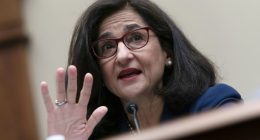
Top U.S. banking regulators are expected as early as Tuesday to commit to jointly modernize rules governing how banks lend hundreds of billions of dollars annually in lower-income communities, according to people familiar with the plans.
At the same time, officials are expected to propose scrapping a Trump-era overhaul of the rules that had divided regulators and industry officials, the people said.
At a time when many banking services have moved online, regulators have been trying to forge a consensus for updating rules from a law enacted more than 40 years ago when banking largely took place at physical branches.
The Office of the Comptroller of the Currency, which oversees national banks and the bulk of the activity under the low-income lending rules, is expected to propose withdrawing controversial changes it pushed through last year without the support of the Federal Reserve and the Federal Deposit Insurance Corp., two other bank regulators responsible for overseeing CRA.
The Community Reinvestment Act is one of the major tools the government uses to encourage banks to lend more to low- and moderate-income communities, at a time when the Biden administration has pledged to do more to address disparities in wealth, incomes and access to financial services among Blacks and other racial groups.
Though all three regulators are expected to announce they plan to jointly modernize the rules In question, a formal joint proposal isn’t expected for several more months, likely not until 2022, the people said.
Banks are evaluated on compliance with the CRA based on a complex formula that includes loans to home buyers and small businesses as well as the number of branches in lower-income areas. Bad grades can restrict banks from merging or opening new branches.
Last year’s regulatory split could have led to an unusual situation in which some U.S. banks would have to follow one set of rules to comply with the law while others have to abide by a different set of rules. The FDIC has also sought to allow most of the community banks it regulates to follow the existing rules, raising the prospect of three different regulatory regimes for a single law.
Critics of the OCC’s earlier overhaul said it was rushed to completion and could unintentionally reduce lower-income lending. It “runs the risk of encouraging some institutions to meet expectations primarily through a few large community-development loans or investments rather than meeting local needs,” Federal Reserve Governor Lael Brainard, who is leading the central bank’s work on the overhaul, said in a speech last year.
Write to Andrew Ackerman at [email protected]
Copyright ©2021 Dow Jones & Company, Inc. All Rights Reserved. 87990cbe856818d5eddac44c7b1cdeb8









